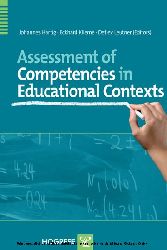Search and Find
Service
More of the content

Assessment of Competencies in Educational Contexts - State of the Art and Future Prospects
A Functional-Pragmatic Concept of Competence (p. 7)
The functional concept of competence, used in the early seventies’ psychology, is explicitly not interested in the generative, cognitive system that is independent from situations or in normative goals of education such as fostering autonomy, but instead it is interested in a person’s ability to cope with challenges in particular situations. In 1973, David McClelland demanded “testing for competence rather than for ‘intelligence’” (p. 1) criticizing the traditional intelligence diagnostic. While intelligence tests are deliberately de-contextualized, McClelland claimed that educational and psychological research needs concepts and assessment procedures that take into account the situation and contextualization of human action. Competence-oriented diagnostics was associated with a hope of improving the adjustment of test contents to real-life situations (e.g., in vocational settings), and thus being better able to predict differences in achievement in these situations. Competence according to McClelland refers to the attributes required for successfully performing particular actions. However, he does not further specify the concept with regard to any particular theory. From his perspective, any kind of individual attribute may be perceived as “competence” as far as it serves to predict success in concrete achievement: “some of these competencies may be rather traditional cognitive ones involving reading, writing, and calculating skills. Others should involve what traditionally have been personality variables, although they might better be considered competencies” (McClelland, 1973, p. 10).
Hence, the history of the subject reveals that a key feature concerning the competence concept is its stronger relation to “real life”. Bandura (1990), a social psychologist, summarizes that “there is a marked difference between possessing knowledge and skills, and being able to use them well under diverse circumstances, many of which contain ambiguous, unpredictable, stressful elements“ (p. 315). Connell, Sheridan, and Gardner (2003) are particularly concise in describing competence as “realized abilities“ (p. 142). While intelligence research assesses cognitive achievement constructs that are generalized across a broad scope of situations, competence constructs adhere to specific areas of demands. Thus, the question: “competent for (doing) what?” is essential to any competence definition.
Nevertheless, descriptions of specific competence constructs will differ as to degrees in how far the postulated competencies can be applied across different situations. Weinert (2001) refers to key competencies that are characterized by a particularly broad scope of transfer, e.g., language competencies, and metacompetencies that facilitate the acquisition and use of specific competencies. Meta-competencies include strategies of thinking, learning, planning and governing as well as knowledge about tasks and strategies and knowledge of your personal strengths and weaknesses.
All prices incl. VAT












